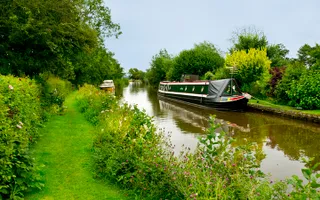Canal boats generally have diesel engines, they often have solid fuel stove heating systems and their toilet systems can use a variety of chemicals which are often harmful to the environment. Yet the vast majority of boaters would agree that they love wildlife and the great outdoors. So what can we do to mitigate or reduce our impact on the environment we care about so much?
Greener, cleaner boating
Getting closer to nature is one of the attractions of boating, but there are lots of ways boaters can be greener.

Water and toilets
Unlike land-based homes where grey water is filtered by the sewerage system, for the majority of boats on the canal, grey water drains directly into the waterway, therefore having the potential to harm wildlife. That’s why it’s so important that any products we use for washing, washing up and laundry are not only ‘eco’ but actually safe for watercourses. Chemicals to kill bacteria (parabens) in beauty products and compounds such as Sodium Lauryl Sulfate (SLS) used to increase the lather in regular soaps and detergents can be toxic to wildlife and can also cause endocrine disruption. Even some ‘eco’ products can contain nasties, so try to go for products that state they are watercourse-friendly. Phosphates in standard cleaning and washing products also contribute to the rapid growth of duckweed and pennywort during the summer and all the problems these pests can cause for us boaters and wildlife.
Changing to 'greener' toilet chemicals for pump-out and cassette toilets, or even changing over to composting toilets provided that you dispose of the waste correctly. Huge advances have been made in recent years in composting toilets that are suitable for boats, but they are not to everyone's taste and you'll still need to dispose of solids and liquids safely and without harming the environment.
And remember to never drop vegetable peelings or any other rubbish into the canal – it can upset the delicate ecological balance of the waterways. Clean and grey water with minimal cleaning products are the only things it's ever acceptable to add to the canal water.
Save energy
Living “off-grid,” most liveaboard boaters have to generate their own electricity which can result in more hours of running our noisy, polluting engines or generators than perhaps we or anybody else would like. The solutions are to reduce the number of things that need powering by electricity, and look at cleaner ways of generating it.
Carry out a power audit of what uses electricity on your boat. Changing lighting from halogen to LED and adding some solar lights can significantly reduce the energy drain on your batteries. Have a look at the other electrical devices on your boat: do you really need an electric toaster, kettle, microwave, washing machine, dishwasher, freezer, hair dryer, sound system and home cinema? Many boaters embrace the simple life and opt for low-tech gadgets that consume little or no power, such as dumb phones, wind-up radios and paper books rather than e-readers.
Go solar
Although it's possible to reduce your electricity consumption, you will still need to generate it to keep your batteries topped up to run water pumps, lighting and to start your engine. Investing in solar power makes great sense for boaters as it's quiet in operation and, depending on your set up, can contribute significantly toward your entire electricity demand. The actual output of solar panels will vary depending upon the time of year, but even during the winter you will still get some contribution towards battery charging. If you want to find out more why not visit Cruising the Cut's informative vlogs on installing solar power and his assessment on winter solar output. Wind turbines are another option but can be very noisy. General boater consensus seems to be that solar power is preferable to wind power.
Waste and recycling
Most of the waste we handle is already diverted from landfill, but more segregated recycling facilities are being installed around the network. Not fly-tipping inappropriate waste at rubbish points, such as used engine oil, old kitchen units, mattresses and more helps protect the environment and also saves the Trust money. It costs us a lot to deal with misuse and fly-tipping, and it's money that could be spent on better things like dredging and vegetation management.
Engines and oil
Well-maintained engines run more efficiently, produce fewer emissions and are less likely to leak pollutants. If you have a leak or spill into your engine bay, please do not pump it out into the canal where it can harm wildlife. Use oil absorbent spill matts, nappies or even cat litter to mop it up and then dispose of it correctly, normally at a local authority waste site. And learn to keep your engine in tip top condition. There are plenty of courses out there if you are a mechanical novice. The IWA has a sustainable boating section, with information about electric boating and biofuels. Don't forget that electric boats get a 25% discount on their licence fee!
There's plenty of advice out there on greener power and reducing your impact on the environment. Whatever you do, we can all make a contribution to protecting our precious canal and river network for now and for the future.
Last Edited: 18 November 2024


Stay connected
Sign up to our newsletter and discover how we protect canals and help nature thrive

